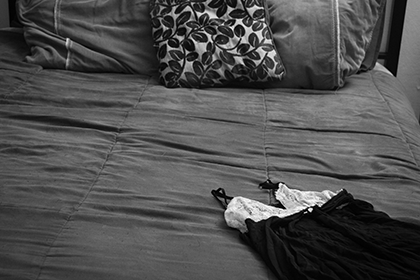I’m a virgin.
There—it’s out there. Shocking that it might seem so shocking, but whenever the topic of sex comes up, somehow the most intriguing thing isn’t who did what where but that I’ve never done it anywhere.
People often say I don’t act like a virgin. What does that entail exactly? Should I faint when I see a bare chest? Or maybe I should just recline on the edge of an active volcano and await the villagers?
When my virginity comes up, it has to be analyzed extensively. The easy solution would be to not bring it up, but when I’m at a bachelorette party or casual social gathering and people are divulging intimate details and asking me to respond in kind with my sexual exploits, I’m candid about the fact that I don’t have any. Lying about my sexual activities would mean I’m ashamed of not having them. I’m not.
I was raised knowing sex is fun and babies are great, but if you’re not willing to raise a kid with a dude, maybe you should hold off.
Very few of my peers are virgins, and those who are seem to have the same obstacles navigating the chaste path. Their reasons are their own, but the obstacles we face in today’s sexually candid society are similar. We’re often asked if we’re religious fanatics. When do we actively decide it’s time to lose it? Are we waiting for marriage? People sometimes expect sex when they’re not seriously dating, so should we tell a guy at the “talking” stage before we get to the “not seriously dating” stage?
At the end of the day, I’m a virgin because I’ve never loved someone romantically—call me naïve but my first time should be with someone I love and trust. And even though I don’t exude the virginal aura, persona, scent that I apparently should, people become very invested in my virginity and when I will lose it.
Dating can be tricky. You’ll hear people say they have the five-date rule or the ninety-day probationary period. All I can think is once I become sexually active, I’ll probably stay that way. So if I keep to the three-month rule and don’t get married, I could have 102 sexual partners by the time I’m 50. I’m just personally not comfortable with that calculation, so ninety days isn’t going to cut it for me.
When I’m interested in someone, I bring up the issue early on. In my first few quasi-relationships (repeat dates that did not lead to exclusive or long relationships), I didn’t bring it up until they did. One said I had insecurities I needed to deal with. One asked how long I expected him to wait. Now I bring it up early, and if it’s a deal breaker or the man shows anything besides respect, I move on—no harm, no foul. I’d like to say I don’t obsess over it, but I do. When you’re enjoying a flirty relationship with someone and know this may be something that they won’t be able to adjust to, it’s uncomfortable; and if it turns out to be an issue, it’s upsetting. But I’ve discovered that not all guys act like the first few did, and I’ve actually been privileged to date a few men who not only showed the utmost respect for my boundaries but also didn’t feel the need to continuously check in to see if I was ready or not.
While dating poses its challenges, the greater obstacles I face are actually from my friends. All my close friends are invested in my sexual status in some way, either trying to sexually liberate me or protect me from the predators I’ll undoubtedly date.
Maybe they’re confused because my sense of humor is more than slightly vulgar: I make sexually explicit comments and gestures; I tease and play. This somehow leads some of my friends to conclude that I need to get laid. When I point out that they are just as vulgar and sexually explicit as I am, and they are getting laid, I’m told it’s “different” and I’ll understand when I’m getting some. News flash: virgins can still discern hypocrisy. They may be right—maybe I’ll mellow out after my first sexual encounter—but I doubt it. Either way, I’ve learned to take it on the chin.
On the other side of the friend spectrum, there are the friends who all want to know if the person I’m currently dating is being respectful and not pressuring me. They offer their words of advice and urge me to wait. Some tell me about their first time as a cautionary tale. What will these friends say if I get sick of waiting for love and one day decide that I want to have a slightly reckless, future-cautionary-tale first time? I know it’s because they care, so what can I do but reassure them that I can handle the situation.
Our society seems progressive concerning sex, with TV shows and movies perpetuating one-night stands or casual sex, while critiquing those that deviate from whatever the norm is in media like TLC’s “Virgin Diaries.” So how do virgins navigate a culture that seems to look down on their entire life experience because they lack one experience? When I think about who I am and what makes me me, “virgin” never makes the list. Yet when attempting to cultivate a relationship I hope will last the rest of my life, it’s the one facet of my identity that those around me and, admittedly, even I get caught up on.

Photo by Rob Adams
